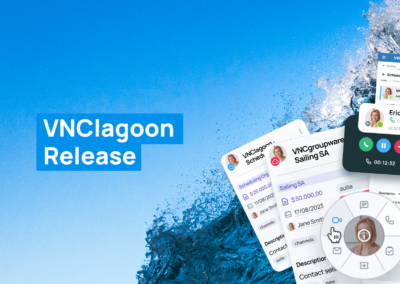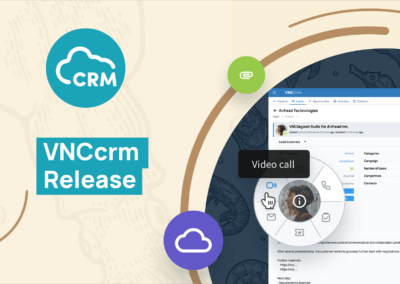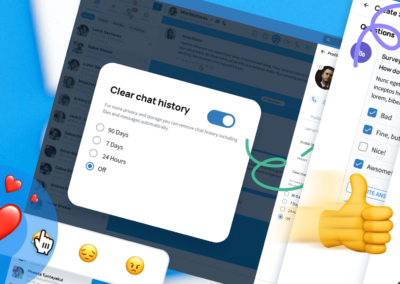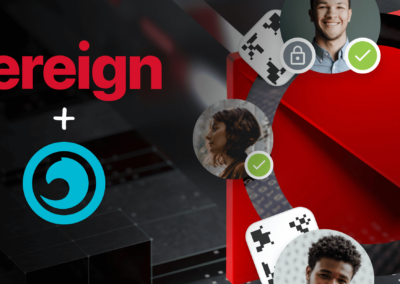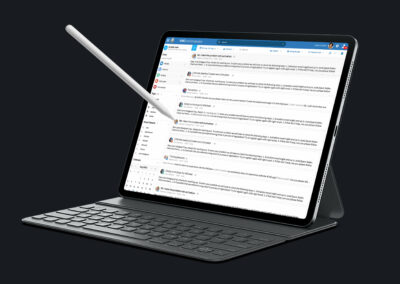By Andrea Wörrlein, Managing Director of VNC in Berlin, Germany, and member of the Board of VNC AG in Zug, Switzerland
Three components are decisive for the further development and optimization of collaboration within a company: the structures in place within a company, the skills and attitudes of its employees and, last but not least, the quality and security of the collaboration tools they use.
Triggered by the onset of a global crisis in the spring of 2020, the means of professional collaboration are changing at a rapid speed. On a global level, this affects the organization of supply chains — whereas on a business level, the ways in which employees collaborate internally and externally is affected.. The obligation to work from home has shattered various outdated structures and swept away decades of employee frustrations. But this is not just an opportunity for restructuring. It is becoming increasingly essential to develop new forms of collaboration for tackling future challenges – which go far beyond temporary solutions in emergency situations.
During this transformation, it is important to consider three key pillars: The corporate structure and culture itself, the employees themselves and the collaboration tools that are made available to them. We have seen, how restrictive the rigid boundaries and convoluted paths of departmental divisions and matrix structures can be. Many companies have already set out to become dynamic, evolving, virtual organizations. This requires courage, farsightedness, tolerance for mistakes and innovation budgets from the leadership levels. But beyond that, companies must not only implement these changes, but also model the mindset necessary for these changes to be a success – because structural change is always a cultural change as well. It’s about the formation of interdisciplinary, success-oriented, as well as at least partially self-organizing teams – not to mention new forms of responsibilities, performance measurement, evaluation, and opportunities for upward mobility.
The associated changes in mindset for each individual are perhaps the most difficult – and therefore most important – part of the change. The better the tools provided for this purpose, the easier it will be. Silos, media disruptions, insufficient interoperability and divergent operating logics in collaboration tools are therefore a no-go. For inter- and intradisciplinary teamwork, applications are needed that, in addition to integrating common work practices such as communication, task management or project management, also offer space and opportunity for the free collection of ideas. In the past, this was called brainstorming and was preferably practiced in one separate meeting per quarter. Today, this can be practiced in suitable applications at any time, because ideas are not limited to fixed meeting hours. The more confidently and efficiently employees can handle it thanks to appropriate training, the more it pays off for the innovative strength of a company. And at the end of the day, this can make all the difference.
About VNC – Virtual Network Consult AG
Seamless Communication and Collaboration: The New Normal for Today’s Enterprise
VNC is a global software corporation that develops open source communication and collaboration applications for large organizations. With its interdisciplinary, high professional developer team, VNC has created an integrated suite of enterprise applications that offer a secure alternative to the established software giants. Now it is possible to collaborate with anyone, from anywhere, on any device, under the strictest privacy standards available while retaining the right to digital sovereignty. VNC – Virtual Network Consult AG, is based in Switzerland, Germany and India, serving a variety of system integrators, financial institutions, network organizations, telcos, non profit groups, healthcare providers, and government agencies and more. For more information visit: https://vnclagoon.com, Twitter @VNCbiz and LinkedIn.
Contact
Andrea Wörrlein
VNC – Virtual Network Consult AG
Poststrasse 24
CH-6302 Zug
Phone: +41 (41) 727 52 00
aw@vnc.biz
Franziska Fricke
PR-COM GmbH
Sendlinger-Tor-Platz 6
80336 München
Phone: +49-89-59997-7o7
franziska.fricke@pr-com.de











